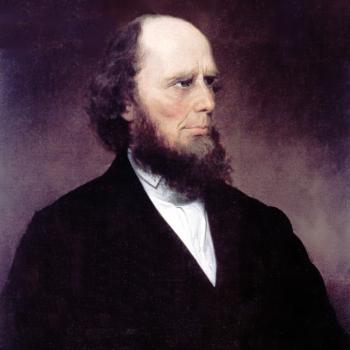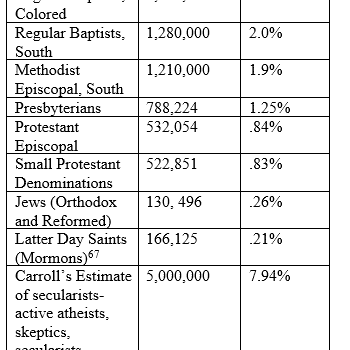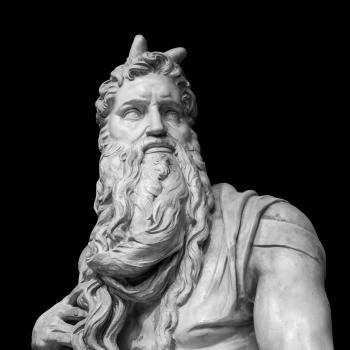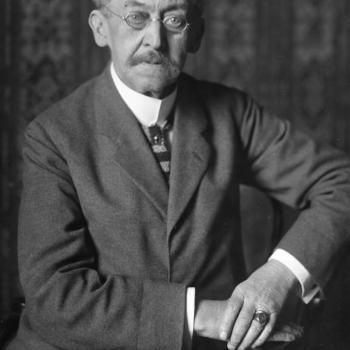As Christians we have often heard the term “the wrath of God” and, in fact, many places in Scripture utilize that exact phrase or something very similar (Lev 20:26; Num 1:53, 16:46, 18:5, 25:11; Deut 29:20; 1 Sam 28:18; 2 Kgs 22:13; Ezra 5:12, Job 21:20, Matt 3:7; John 3:36 etc). But what does “wrath” really mean? Is our God an angry God, who looks down from on high hoping to find some reason to destroy us? Should we live in fear of God’s burning anger? These are valid questions which we will explore in this and subsequent articles.
The wrath of God is not just a question for the 21st century, it has been asked in every age. In the second century after Christ, many doctrines were under question and Church councils were convened to hammer out true orthodoxy based on the authority of Scripture and the leading of the Holy Spirit. Many times not just false teachings but the teachers themselves were sanctioned by the Church. I’ll start this series looking at one of the most infamous of those teachers.
Marcion’s Heresy: Not One, But Two Gods?
One such individual who promoted an ultimately false view of God was Marcion. Marcion was born in Sinope in Pontus in 84 AD and traveled to Rome where he became a believer in 135. He began speaking publicly and in his preaching attempted to justify why the God of the Old Testament seems different than the God of the New Testament. The main reason, according to Marcion, for thinking there were two gods and not one God, was the apparently violent character of Yahweh.
The Old Testament often portrays God as wrathful, ordering his people to commit genocide (Num 21:2-3; Josh 6:17,21), causing widespread disease (Num 11:31-34, 14) killing hundreds and thousands of people, and calling His people to do likewise (Deut 20). In apparent contrast to the God of the Old Testament, Jesus in the New Testament preaches peace, love for one’s enemies, care for the orphan and widow, and gives Himself up to save the world. I say “apparent contrast” because all of Jesus’ commands are also found in the Old Testament (see Exod 23:4-5; Lev 19:18; Prov 24:17, 25:21 and 29:10). This is a intertextual fact even many Christians today tend to miss.
Nevertheless, for Marcion, the way YHWH is presented in the Old Testament and the way Jesus acts in the New could only mean there were two different gods. Irenaeus tells us that Marcion:
advanced the most daring blasphemy against Him who is proclaimed as God by the law and the prophets, declaring Him to be the author of evils, to take delight in war, to be infirm of purpose, and even to be contrary to Himself.
For Marcion, however, Jesus
was manifested in the form of a man to those who were in Judæa, abolishing the prophets and the law, and all the works of that [other] God who made the world, whom also he calls Cosmocreator.
Phillip Schaff, The Apostolic Fathers with Justin Martyr and Irenaeus, Chapter 27, emphasis added
Marcion went so far as to deny the entirety of the Old Testament as inspired Scripture and threw out much of the New Testament as well, thus eliminating any reference to the “Old Testament,” or Jewish, God.
Irenaeus and Tertullian: Against Heresies
While the works of Marcion are not extant, we can recreate many of his teachings from the judgements which were issued against him. Irenaeus, Justin Martyr, and Tertullian were 2nd century writers who vehemently refuted the teaching of Marcion. They condemned his view that the God of the Old Testament was a vengeful, angry creature who railed violently against His own creation when they went astray. They denied that Jesus could be an entirely different god who ushered in a new era of peace and love, and defeated the Old Testament God by His death. All of them gave evidence from the Scriptures that Jesus was not overthrowing Yahweh, but, in fact, carrying out the will of Yahweh with whom Jesus was also eternally one.
For example, in Against Heresies, Irenaeus makes it quite clear that Jesus cannot be some other God, nor can Yahweh be some lesser deity:
Thus then does the Lord plainly show that it was the true Lord and the one God who had been set forth by the law; for Him whom the law proclaimed as God, the same did Christ point out as the Father, whom also it behoves the disciples of Christ alone to serve. By means of the statements of the law, He put our adversary to utter confusion; and the law directs us to praise God the Creator, and to serve Him alone. Since this is the case, we must not seek for another Father besides Him, or above Him, since there is one God who justifies the circumcision by faith, and the uncircumcision through faith. For if there were any other perfect Father above Him, He (Christ) would by no means have overthrown Satan by means of His words and commandments.
Against Heresies, Book V Chapter XXII
Tertullian, the first great articulator of the essential unity of God and distinctiveness of His persons, further articulates Marcion’s grave error in assuming Jesus’ superiority to YHWH. Jesus did not come to usurp or take the place of some lesser god as Marcion argued. Rather Jesus, the Son, is from God the Father and, moreover, can do nothing apart from the Father’s will:
Now you must understand the overthrow of a monarchy to be this, when another dominion, which has a framework and a state peculiar to itself (and is therefore a rival), is brought in over and above it: when, e.g., some other god is introduced in opposition to the Creator, as in the opinions of Marcion; or when many gods are introduced, according to your Valentinuses and your Prodicuses. Then it amounts to an overthrow of the Monarchy, since it involves the destruction of the Creator. But as for me, who derive the Son from no other source but from the substance of the Father, and (represent Him) as doing nothing without the Father’s will, and as having received all power from the Father, how can I be possibly destroying the Monarchy from the faith, when I preserve it in the Son just as it was committed to Him by the Father?
Tertullian, Against Praxeas, 3-4
Marcion, to his discredit, succumbed to the temptation that may face some today; that is, to reduce the God of the Old Testament, the God of Israel and the Jewish people, to a different being in order to excuse His violence. Or, instead, we might, whether implicitly or explicitly, deny the authority of the Old Testament and preach only out of the New thinking this, and this alone, is what is applicable to the church. Both of these are errors which we as believers, lay leaders, and pastors must avoid. We have good reasons to avoid either bifurcating the being of God or severing the unity of the Scriptures.
Wrath and Accommodation: How God Reveals Himself
First, we must remember that “All Scripture is breathed out by God and profitable for teaching, for reproof, for correction, and for training in righteousness” (1 Tim 3.16 ESV). In the time of Paul’s writing these words, it could only have been the Old Testament scriptures he had in mind. Thus, if we take the New Testament as inspired and if 1 Timothy is legitimately part of the New Testament canon, then we must take Paul’s claim about the Old Testament seriously. As such, both Testaments are given to us by God, both are His self-revelation to posterity, and both are, therefore, authoritative for the believer. This is a pillar of orthodoxy from which we must not waver in establishing orthopraxy.
Baptist pastor and author Steven Butler Murray tells us:
There is a pervasive tendency to characterize the New Testament as singularly about Jesus’ messages concerning love and salvation, with any hint of God’s wrath subsumed in reference to the Old Testament. Furthermore, this attitude seems to maintain that if the New Testament does mention divine wrath it does so only out of an outmoded obligation to its Old Testament heritage.
Reclaiming Divine Wrath, 28
This is the mistake of Marcion and many others throughout Church History, including today. In order to make sense of the seemingly disparate messages of the Testaments we attempt to discount, overlook, or explain away the Old Testament. Yet, to follow the Apostle Paul’s instruction to Timothy and to us all, we must not fall into this trap. All Scripture means all scripture, to include the Hebrew Bible.
Second, we must remember that God reveals Himself differently for different times. This is told to us explicitly in Hebrews 1, where the author says that God has indeed revealed Himself “in sundry times and divers manners” (Heb 1:1, KJV). For example, God’s will for the Hebrew people was explicitly and particularly to occupy the Land of Promise, and so He justified violent takeover in the interest of assuring His own covenant for that time and in that place.
Also, His anger against sin is a result of God’s enduring holiness. Holiness cannot tolerate sin: sin is antithetical to it and to those who display God’s image. In these ways God reveals Himself as the sole authority who can enact and order violence on His behalf. This is not a prerogative that can be simply transferred to human beings, as any critical thinker, Christian pacifist or just war theorist will tell you. As such, we must be careful to understand how the Bible portrays God given the historical and cultural circumstances of the time. If we do this rightly, we will see more clearly what God’s anger, and what God, is really like.

What is the True Nature of God’s Wrath?
Pittsburgh Seminary theologian Jerome Creach writes:
It may be helpful to recognize that the words ‘anger’ and ‘wrath’, words that appear frequently in the Old Testament and particularly the prophetic books, have created for some the false idea that God…is by nature an angry god who exacts harsh judgement on disobedient creatures as a first response.
Violence in Scripture, 66
Creach goes on to emphasize that many, if not most, of the difficult Old Testament passages in which God condones or orders violence reveal Him in three ways. First, God as the Divine Warrior, coming to save His people; second, God as the Divine Judge, acting against sin and wickedness; and third, God as the Divine Redeemer, who rescues His people from their enemies. When properly understood, who among us would not desire a God like this: a God who fights for us, who shows us right from wrong and who rescues us from our enemies, be they external foes or our own, internal demons?
Ultimately, it is the responsibility of the believer to read the Old Testament and to endeavor to understand what is being presented, even (especially) when it seems to go against our modern mores. Thus, we agree with C.S. Lewis who said of how the Scriptures present God:
The two things one must NOT do are (a) To believe, on the strength of Scripture or on any other evidence, that God is in any way evil. (In Him is no darkness at all.) (b) To wipe off the slate any passage which seems to show that He is. Behind that apparently shocking passage, be sure, there lurks some great truth which you don’t understand. If one ever does come to understand it, one will see that [He] is good and just and gracious in ways we never dreamed of. Till then, it must be just left on one side.
Lewis, Letter to Emily McLay
God’s Wrath and Our Anger
The short answer to the question this article poses is, in fact, yes. However, what God is wrathful about or towards matters with regard to how we answer the question. We serve a God who desperately hates sin, wickedness, and all unrighteousness. His holiness cannot tolerate those things, nor will His love allow them to persist as if they were not what they are. However, God’s nature is not characterized by that anger. Murray again makes the observation that just as we cannot tolerate a full revelation of God Himself, neither can we absorb the immensity of any aspect of God’s nature revealed in its fullness (Wrath, 27). Thus the revelation of the God of mercy must be tempered by the revelation of a God of wrath as well.
Further, God’s nature is that of love, which the Apostle John tells us clearly (1 John 4:8). But Love and Wrath are not mutually incompatible, in fact they are quite consistent. It is His love that calls us to Himself, that provided the Incarnation and the Atonement, and which will bring about His kingdom on earth in the last days. That this action will be accompanied by great violence against evil should comfort us rather than cause us fear.
Finally, God alone is capable of being righteously angry, His anger does not ever justify our own. God alone possess all knowledge, and, in virtue of His omniscience knows perfectly well when, where and how violence may be justly used. We do not have this capacity, or, at least, have it in only a very limited sense. As such, the Apostle Paul tells us to be angry and not sin, yet because this is nearly impossible for sinful creatures, in the same passage he goes on to say: “Let all bitterness and wrath and anger and clamor and slander be put away from you, along with all malice. Be kind to one another, tenderhearted, forgiving one another, as God in Christ forgave you.” (Eph 4.31-32 ESV)
James goes further to state that human anger cannot bring about God’s righteousness (Jas 1.20 ESV). Thus as Christ followers we must recognize that often our anger is sin, and we must ask forgiveness of the Father when we become angry. It is possible to be righteously angry against sin? Yes, but it is very rare for us to be righteously indignant. Thus, vengeance belongs to God alone, and we can pray that He punish sin, while not taking the sinful actions we desire to enact against others. Let us then care for others and show God’s love, allowing Him alone to be the Lord of wrath. It is, after all, His command that we do so:
To me belongeth vengeance and recompence; their foot shall slide in due time: for the day of their calamity is at hand, and the things that shall come upon them make haste.
Deuteronomy 32:35
This article was co-authored by Nathan Amerson and Anthony Costello.

















